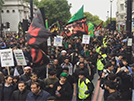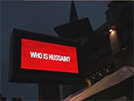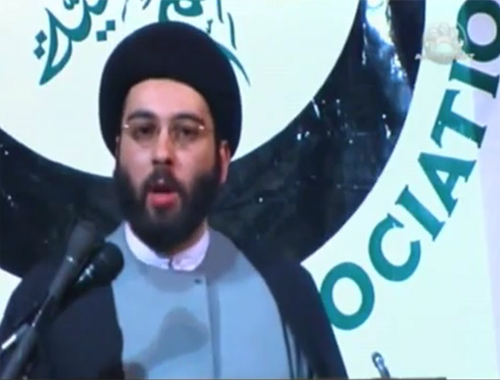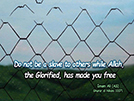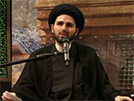Verse142
- Details
- Hits: 2806
(142) سَيَقُولُ السُّفَهَاء مِنَ النَّاسِ مَا وَلاَّهُمْ عَن قِبْلَتِهِمُ الَّتِي كَانُواْ عَلَيْهَا قُل لِّلّهِ الْمَشْرِقُ وَالْمَغْرِبُ يَهْدِي مَن يَشَاء إِلَى صِرَاطٍ مُّسْتَقِيمٍ
142. " The fools among the people will say: ' What has turned them from their Qiblah (direction of prayer) which they were facing at.' Say: ' Allah's is the East and the West; He guides whoever He pleases to a straight way '."
Commentary :
Occasion of the Change of Qiblah
This verse together with a few verses following it refers to one of the great happenings in the history of Islam which caused a huge wave of excitement among the people of that time. The explanation for the occurrence is that the Prophet of Islam (p.b.u.h.), under divine direction, prayed towards the direction of Jerusalem for thirteen years in Mecca after proclaiming his mission and then, also, for several months in Medina after his migration. But again, under divine direction, the Qiblah (i.e. the direction of prayer) was changed and Muslims were commissioned to pray towards the Ka'bah.
The commentators are divided as to the length of time that Muslims worshipped facing towards Jerusalem in Medina. The duration of this ritual situation has been cited from seven to seventeen months. However, during this period, Muslims were always entangled with the reproaches of the Jews, because Jerusalem was originally the Jewish Qiblah. Since the Muslims used to pray towards the direction of Jerusalem, the Jewish Qiblah, during that time, they blamed that their (Muslims) acceptance of their (Jewish) Qiblah proved, as they thought, that the Jews were right in their creed and Muslims, who were not independent for themselves in the direction of prayer, were not.
These statements were difficult for the Prophet of Islam (p.b.u.h.) and Muslims to bear. They were, on one hand, showing obedience to the command of Allah, and, on the other hand, the ceaseless sarcasm of the Jews was intolerable. It was for this reason that by night Prophet Muhammad (p.b.u.h.) occasionally turned his face towards the heavens in a way that showed he was expecting to receive Divine revelation.
After some time of waiting, finally the command for changing the Qiblah was revealed. It was while the Prophet (p.b.u.h.) was praying the noon prayer and he had already performed only two rak'ats of the prayer in Bani-Salim Mosque towards the direction of Jerusalem when Gabriel was commissioned by Allah to take the arm of the Prophet (p.b.u.h.) and turn his face towards the direction of the Ka'bah.
The Jews were annoyed with this occurrence and according to their old traditional style, they began seeking pretexts. Aforetime, they used to say that they were superior to Muslims because Muslims were dependent on the Jews regarding their Qiblah. But, when the command of changing the Qiblah was sent down by the Lord, a party of the Jews protested; as the Qur'an says:
" The fools among the people will say: ' What has turned them from their Qiblah (direction of prayer) which they were facing at ? '..."
The Jews disputed about why the Muslims altered the former prophets' Qiblah that day. They said if the first Qiblah was correct, then why the change? And, if the second one was right, then why had they been praying towards the direction of Jerusalem for more than thirteen years?
The Lord ordered His Apostle thus:
"...Say: ' Allah's is the East and the West; He guides whoever He pleases to a straight way'."
Similar to this circumstance the words East and West, besides the verse under discussion, have occured in four other verses of the Qur'an: 2: 115, 2: 177, 26: 28, 73: 9. There is a short explanation about their objective meaning when commenting on verse 115 (pg. 267 this vol.). The content meaning of these terms refers to the Omnipresence of Allah as the Absolute Reality, the hold of which penetrates the universe in its every part and particle as well as its whole, meaning both the rise of the light in the East and its setting in the West are the various aspects of manifestation of Allah's Mighty and Glory i.e., whichever direction the mind turns there is this aspect of His.
This verse was a decisive clear reasonable answer for those who sought pretext by letting them know that Jerusalem, the Ka'bah and all other places belong to Allah, and, intrinsically, Allah has no house and no place; He is the Omnipresent. The main principle here is that we servants should submit to His command and whatever direction He appoints for prayer, that direction is sacred and respectable and that direction should be prayed towards. Without His commission, no place has excellence or preference in its own essence.
And, the change of the Qiblah, in fact, is one stage of the many different stages of trial and development, each of which is an example of Divine Guidance. It is He Who guides people to the ' Straight Path '.
(1) The commentary of the First part of the Holy Qur'an ended of the previous page, but verses about the theme of Qiblah in the Qur'an is still continued. Hence, to complete the idea, we had to add some verses of part2 , here, at the end of this volume.



